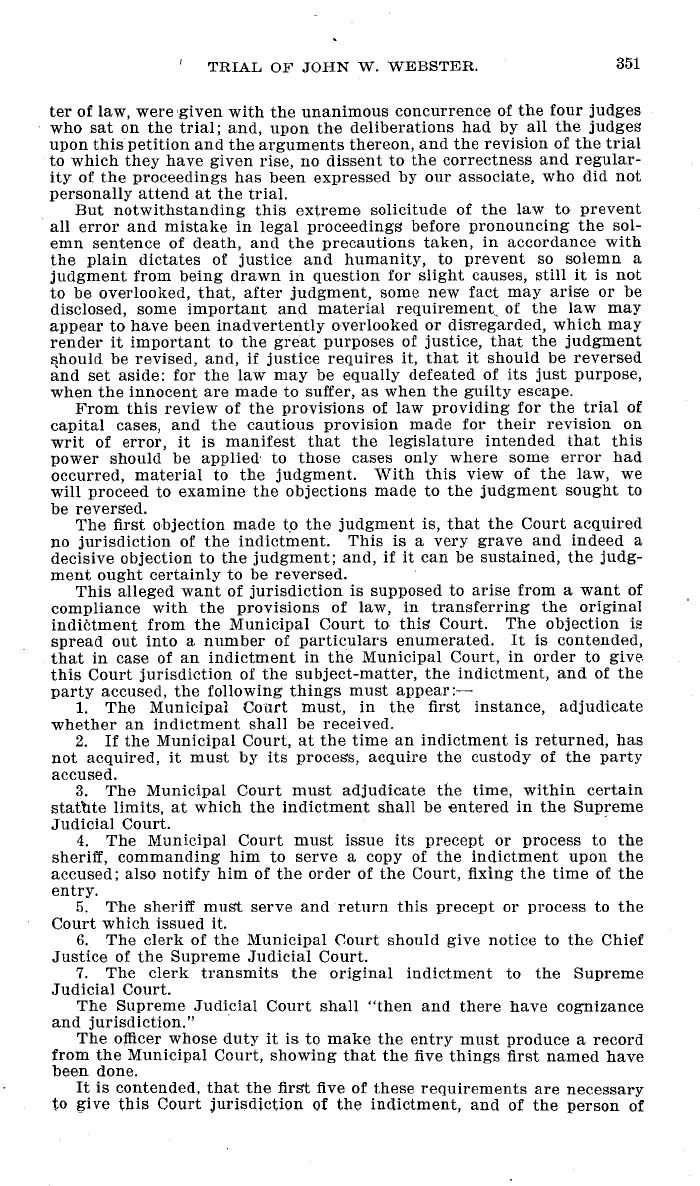|
" TRIAL OF JOHN W. WEBSTER. 351
ter of law, were given with the unanimous concurrence of the four judges
who sat on the trial; and, upon the deliberations had by all the judges
upon this petition and the arguments thereon, and the revision of the trial
to which they have given rise, no dissent to the correctness and regular-
ity of the proceedings has been expressed by our associate, who did not
personally attend at the trial.
But notwithstanding this extreme solicitude of the law to prevent
all error and mistake in legal proceedings before pronouncing the sol-
emn sentence of death, and the precautions taken, in accordance with
the plain dictates of justice and humanity, to prevent so solemn a
judgment from being drawn in question for slight causes, still it is not
to be overlooked, that, after judgment, some new fact may arise or be
disclosed, some important and material requirement of the law may
appear to have been inadvertently overlooked or disregarded, which may
render it important to the great purposes of justice, that the judgment
should be revised, and, if justice requires it, that it should be reversed
and set aside: for the law may be equally defeated of its just purpose,
when the innocent are made to suffer, as when the guilty escape.
From this review of the provisions of law providing for the trial of
capital cases, and the cautious provision made for their revision on
writ of error, it is manifest that the legislature intended that this
power should be applied to those cases only where some error had
occurred, material to the judgment. With this view of the law, we
will proceed to examine the objections made to the judgment sought to
be reversed.
The first objection made to the judgment is, that the Court acquired
no jurisdiction of the indictment. This is a very grave and indeed a
decisive objection to the judgment; and, if it can be sustained, the judg-
ment ought certainly to be reversed.
This alleged want of jurisdiction is supposed to arise from a want of
compliance with the provisions of law, in transferring the original
indictment from the Municipal Court to this Court. The objection is
spread out into a number of particulars enumerated. It is contended,
that in case of an indictment in the Municipal Court, in order to give.
this Court jurisdiction of the subject-matter, the indictment, and of the
party accused, the following things must appear:-
1. The Municipal Coart must, in the first instance, adjudicate
whether an indictment shall be received.
2. If the Municipal Court, at the time an indictment is returned, has
not acquired, it must by its process, acquire the custody of the party
accused.
3. The Municipal Court must adjudicate the time, within certain
stathte limits, at which the indictment shall be entered in the Supreme
Judicial Court.
4. The Municipal Court must issue its precept or process to the
sheriff, commanding him to serve a copy of the indictment upon the
accused; also notify him of the order of the Court, fixing the time of the
entry.
5. The sheriff must serve and return this precept or process to the
Court which issued it.
6. The clerk of the Municipal Court should give notice to the Chief
Justice of the Supreme Judicial Court.
7. The clerk transmits the original indictment to the Supreme
Judicial Court.
The Supreme Judicial Court shall "then and there have cognizance
and jurisdiction."
The officer whose duty it is to make the entry must produce a record
from the Municipal Court, showing that the five things first named have
been done.
It is contended, that the first five of these requirements are necessary
to give this Court jurisdiction of the indictment, and of the person of
|

